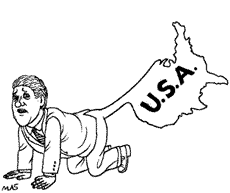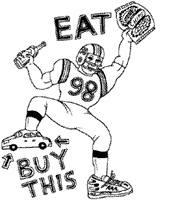Movies

Wag the Dog (New Line Cinema). Pundits can't resist noting the "scary prescience" (Janet Maslin, the New York Times) of Barry Levinson's acclaimed satire about a fake war orchestrated to divert attention from a presidential sex scandal. Their spin on the eerie parallel between art and life: 1) Maybe Hollywood does understand Washington. 2) The movie may stop Clinton from attacking Iraq, since that move would seem contrived. 3) L'affaire Lewinsky is the superior drama: "Nobody writes better scripts than Washington, D.C." (Stephen Hunter, the Washington Post). Sidebar: Hollywood reporters say Universal Studios is panicking over when to release Mike Nichols' adaptation of the Clinton satire Primary Colors, currently due out in March. (See Jacob Weisberg's dispatch in Slate.)
Gingerbread Man (PolyGram). Having expected a disaster, most critics confess surprise that Robert Altman's direction redeems this thriller, which began as a hokey John Grisham story. "Hitchcock would have been intrigued, and maybe envious," says the Wall Street Journal's Joe Morgenstern. What keeps this from being yet another Grisham movie is, apparently, Altman's idiosyncratic camera work and Kenneth Branagh's winsome performance as a slick Southern lawyer. Dissenters complain that Grisham's plot is unbecoming material for a director of Altman's caliber. "One feels great risks were not taken, which is unusual for even the worst Altman films," says the New York Observer's Andrew Sarris.
Spice World (Columbia). Movie reviewers echo the music critics' pans of the popular Spice Girls and conclude that "sometimes the Zeitgeist counts for squat" (David Kronke, the Los Angeles Times). The group's feature film, in which they're harassed by a tabloid reporter, is trashed as a "plotless, pointless, mirthless" knock-off of the Beatles' Hard Day's Night (Richard Harrington, the Washington Post). The pop stars do get credit for exhibiting self-deprecating humor and apparent awareness that "they have achieved ludicrous measures of fame and fortune on the strength of markedly limited talents" (Anthony Lane, The New Yorker). (Clips are available.)
Books
Birthday Letters, by Ted Hughes (Farrar, Straus & Giroux). An autobiographical book of verse by the British poet laureate and former husband of iconic poet Sylvia Plath revives the cultish fascination with her suicide in 1963 at age 30. Most critics applaud Hughes for breaking his 35-year silence about his marriage and admitting his insensitivity and infidelity, which some claim drove Plath over the brink. Others, including feminist literary scholars such as Elaine Showalter, complain that Hughes doesn't sufficiently own up to the consequences of his adultery. "Hughes should have been as merciless to himself as she was with herself" (Jack Kroll, Newsweek). Still others dismiss the poems as "clumsy stuff" (Ian Hamilton, the Sunday Telegraph).
Night Train, by Martin Amis (Harmony Books). The British bad-boy writer tries his hand at an American detective novel and draws mixed reviews. Some dismiss Amis' use of police lingo and his intricate story about a suicide investigation as bad parody. The policemen, says Luc Sante in Slate, seem to be "cut and pasted from a vague memory of Barney Miller." The New York Times' Michiko Kakutani and others relish Amis' verbal cleverness and defend the book as a "deliciously readable, highly polished diversion." (An excerpt is available.)
Enduring Love, by Ian McEwan (Doubleday). Applause for The Cement Garden author's thriller about a science writer and an evangelical drifter who's obsessed with him. Critics like McEwan's plot twists (you're not sure if the Christian is psychotic until the end) and theoretical bent (high-minded riffs on Darwin and Keats). In Slate, Alice Truax compares McEwan with Thomas Hardy, another "great master of morality, psychology, and circumstance, but ... McEwan makes you nervous." Others find McEwan's intellectualism too snooty, making the novel feel like "a storified lecture" (Richard Eder, the Los Angeles Times). (Click here for an excerpt.)

Event
Super Bowl XXXII (San Diego). An exciting game and watchable halftime show deflated the perennial gripes with Super Sunday, leaving critics only the overhyped, overpriced commercials to kvetch about. "Surely a future Super Bowl will see players selling commercial space on their butts," says the Washington Post's Tom Shales. Reasons for outrage: exorbitant cost ($1.3 million for a 30-second spot) and banal products. The biggest disappointment was a two-part Intel ad, narrated by Steve Martin, that allowed viewers to log on to the Internet to vote for its ending, to no apparent consequence.
Dance
"Mikhail Baryshnikov: An Evening of Music and Dance With the White Oak Chamber Ensemble" (City Center, New York City). On the occasion of his 50th birthday, the dancer ascends to mythic proportions with a majestic solo concert. "The profundity of an artist such as we won't see again for some time" (Sarah Kaufman, the Washington Post). Critics forgive his use of goofy gimmicks--he improvises a dance to his own heartbeat, which is amplified by a device affixed to his chest--focusing instead on the credibility he has given modern dance, having switched from classical ballet in midcareer.
Update
The conventional wisdom about the musical Ragtime continues to fluctuate. This week several critics dub it the Great American Musical, including The New Yorker's John Lahr, who pronounces it "a theatrical watershed: an awesome pyrotechnical display of theatrical craft and showmanship."
Recent "Summary Judgment" columns
Movie--Fallen;
Movie--Sundance Film Festival;
Movie--Live Flesh;
Musical--Ragtime;
Book--Pillar of Fire: America in the King Years, 1963-65, by Taylor Branch;
Book--Shadows on the Hudson, by Isaac Bashevis Singer;
Television--South Park (Comedy Central);
Art--"Arthur Dove: A Retrospective" (Whitney Museum).
Death--Sonny Bono;
Book--A Prayer for the City, by Buzz Bissinger;
Book--Cold Mountain, by Charles Frazier;
Book--The World According to Peter Drucker, by Jack Beatty;
Movie--Afterglow;
Movie--Arguing the World;
Movie--Ma Vie en Rose.
Movie--The Apostle;
Movie--Oscar and Lucinda;
Movie--The Boxer;
Television--Seinfeld (NBC);
Book--Truman Capote: In Which Various Friends, Enemies, Acquaintances, and Detractors Recall His Turbulent Career, by George Plimpton;
Book--Paradise, by Toni Morrison;
Music--"Northern Lights: The Music of Jean Sibelius."
Winter Movie Roundup
--Franklin Foer
